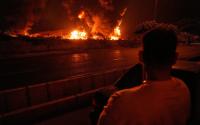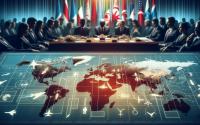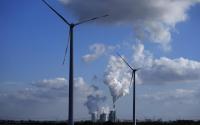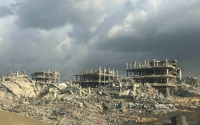1 September 2005Cynthia Bogard
With a horrible decisiveness, Hurricane Katrina has sheared off the front of the American doll house, leaving our decimated national infrastructure for all the world to see. It's not a pretty sight, especially given the current administration's propensity to bluster about America as "the greatest nation on earth" and the "world's superpower."
The consequences of a generation of looting the funding for public works projects, anti-poverty programs, and local and national administrative capacity coupled with rollbacks of federal energy and environmental regulation have been revealed in all their stark reality by this epic storm. Relentless Republican-led but Democratic Leadership Council-supported attacks on "big government" (by which they meant programs of no immediate use to global corporations) in the past two decades have been remarkably successful. "The era of big government," as DLC poster boy Bill Clinton famously declared in the mid 1990s, "is over."
He was talking about what other wealthy democratic nations refer to as their "welfare state"--that constellation of tax-financed regulations and services that provide citizen security on "quality of life" issues such as housing, education, healthcare, safety, a healthy environment and economic stability in times of unemployment. Included also in other nation's welfare states is public infrastructure that can be counted on in such areas as transportation, communication, electricity, and clean water. In other wealthy democracies, that's what government is largely for; these are the kinds of citizen protections those living in poor nations dream about.
Now that Katrina's come to town, it's become all too apparent how far down the road to the wholesale giveaway of America's collective wealth to its wealthy we have traveled. And the consequences of purposely destroying our modest welfare state have become devastatingly clear--well, at least to some.
A few days ago, Louisiana Governor Kathleen Babineaux Blanco ordered the evacuation of New Orleans, an event which proceeded, according to many accounts, in a remarkably orderly fashion. As it turned out, however, about 20% of residents did not "choose" to leave town--a fact that the governor publicly grumbled about after the levees were compromised, the city inundated and those "left behind" put at risk for their lives in the floodwaters and sweltering heat.
One observant commentator noted that the evacuation was indeed very efficiently run "if you had a car." Those left behind were drawn disproportionately from the 30% of the city's residents who are chronically poor. They had no cars, Governor.
An astute downtown New Orleans attorney interviewed on National Public Radio noted from the safety of a friend's house a safe distance from town that Katrina had happened at the end of the month, "when many of the poor have run out of funds." Put these facts of no cars and no cash together with some typical copying strategies for surviving chronic poverty and gaping holes in public services and infrastructure and it becomes all too clear why many impoverished and disproportionately Black citizens of New Orleans didn't "choose" to evacuate.
It's harrowing enough to leave town in one's reliable vehicle armed with luggage, credit cards and cash, bound for some well-heeled friend or relative who lives at a higher elevation. It's quite another thing to leave with no cash, no car, no credit and no out of town relatives with room to spare. Poor people without employment typically depend on very local resources for their survival, especially when money and food stamps run out. Even in the most generous northern states, public assistance checks usually run out in the middle of the third week of the month no matter how good at budgeting a mother may be. The last ten days of the month are spent trading what resources you have for what you need, calling on those who owe you a favor, asking for leniency in paying for necessities and pawning the few worthy possessions you own. And waiting for the check.
All of these coping strategies require that poor people remain in close proximity to those on whom they must depend for survival. Katrina caught New Orleans' poor just in the most desperate phase of this depressing monthly struggle for survival. As someone who has spent a dozen years listening to the stories of people who have become homeless in less dramatic fashion than the citizens of New Orleans just did, it was no surprise to me that the poor mostly remained home or made their way to the local shelter--the Superdome. Where was the government before the levees broke with buses and trains, assurances about shelters far away, food and cash vouchers for necessities? For many poor people the risk of leaving far outweighed the risk of staying--at least until the levees broke and water poured into their neighborhoods. And by then it was too late.
I've seen footage of people huddled on their rooftops, waving sheets and homemade "help us" posters. I saw hundreds, elderly folks and babies included, left to bake in the ninety degree sun on an unprotected overpass. Where was the evacuation plan and resources to help those who couldn't help themselves?
Some of these people will die. Indeed, some already have, from nothing more than the neglect made more likely because the emergency services infrastructure in many local communities never existed in the first place or has been scaled back due to falling tax revenues and "no big government" attitudes.
The last line of protection in disasters such as this is the National Guard. Only two thirds of these public servants were in the local area and available for deployment. The rest are in Iraq. The communities hit by Katrina, especially the larger, more urban, more impoverished communities simply lacked adequate numbers of trained and ready personnel and equipment to do the job.
In the past few years, an increasingly bold Congress has made matters even worse. Funding for the crucial public works project that could have prevented the loss of New Orleans--the improvement of the levee system--was drastically cut. Wetlands, a natural barrier to storm surges that once characterized the Mississippi Delta, have been given over to developers to fill in and build on. Global warming deniers have also muffled any national conversation about how we should live differently now that dramatic weather events will become more common. In perhaps the most callous example of what occurs when government becomes the tool of capitalism rather than the servant of the citizens, New Orleans Mayor Ray Nagin now has ordered the police force to abandon their search and rescue mission in favor of halting looters. In other words, police officers are being told they're in the business of protecting property instead of people.
In a disaster of these proportions, there's always the tendency to look for someone to blame. This time we're all to blame, for allowing our collective system of protection, our government, to be hijacked by corporate interests and their politician lackeys. Katrina will take the lives of many. Some of those deaths "big government" could have saved.
Cynthia J. Bogard ([email protected]) is a professor of sociology at Hofstra University in New York.






